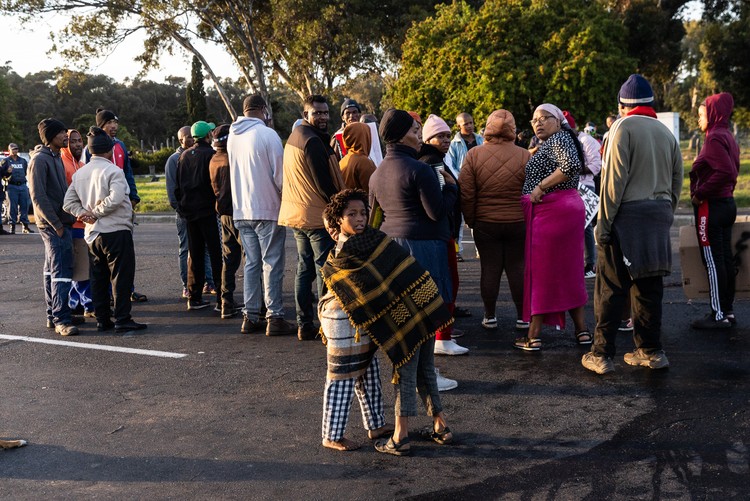Cape Town protesters block busy road, demanding services
They are angry that refugees living in a tent on the same land have toilets and water, but they do not
Families from the “Gate 7” informal settlement outside the Maitland Cemetery blocked Voortrekker Road in Cape Town on Wednesday morning. They want the City of Cape Town to install water, electricity and toilets. Photos: Ashraf Hendricks
About 40 protesters from the “Gate 7” informal settlement outside the Maitland Cemetery blocked busy Voortrekker Road in Cape Town with burning branches, mattresses, rocks and a container early on Wednesday morning.
Protesters are demanding basic services including water, toilets and electricity. When GroundUp arrived around sunrise, fire trucks were dousing flames and metro police were patrolling the area. Across a large container in the middle of the road, protesters had sprayed “30 years without basic services”.
The land on which the “Gate 7” settlement is built is owned by the Ndabeni Communal Property Trust, formed to benefit families forcibly moved from their land about 80 years ago. The Trust asked the City of Cape Town and national government to move the people living in shacks, but to no avail.
Next to the settlement is a large white tent which houses a group of refugees. The refugees were involved in protests in 2019 outside the United Nations High Commissioner for Refugees (UNHCR) offices in Cape Town, demanding to be resettled in another country. They were relocated to camps in Maitland and Bellville in 2020 and some were deported.
On Wednesday, resident Funeka Mayongo said that she has lived in Gate 7 settlement for 20 years. “I voted several times, but no one is helping me”. Mayongo says most of the more than 500 people living on the land are unemployed.
Mayongo says they are tired of having to collect water from the people at the tent site.
People living at the “Gate 7” informal settlement outside the Maitland Cemetery want toilets and water.
Nomaphelo Bevu has lived in Gate 7 for 15 years. She says that without toilets they have to relieve themselves in the surrounding bush. Bevu’s eight-year-old child is autistic. She struggles to properly care for him without water and toilets.
She says that it’s painful seeing the people in the tent with services, but as “voters of South Africa, we have nothing”. Bevu says they are constantly being threatened with evictions and intimidation from law enforcement officials.
The City’s subcouncil 15 Chairperson, Angus McKenzie, who was at the protest, said the group had unlawfully occupied the privately owned land. “The City is unable to provide services…on land which is not their own without prior arrangement between the landowner and City”.
McKenzi said the City was not ignoring the plight of the residents and promised to meet with the residents later on Wednesday to try and find a solution.
Police removed a large container used by protesters to block the road early on Wednesday.
Next: Three years after a court order, illegal dumps in Makhanda have not been cleared
Previous: Colchester clinic is crumbling, with broken ceilings, windows and no electricity
Letters
Dear Editor
The one child policy in China, also known as the "One Child Rule," was a population control policy implemented from 1979 to 2016. While it was not specifically designed to eliminate poverty, it was intended to reduce population growth and alleviate related social and economic issues, including poverty.
1. Reduced population growth: By limiting family size, the policy contributed to a slower population growth rate, which in turn reduced the number of people living in poverty.
2. Increased investments in education and healthcare: With fewer children to support, families and the government could invest more in education and healthcare, leading to improved human capital and reduced poverty.
3. Increased economic growth: By reducing the burden of a large population, the policy may have contributed to China's rapid economic growth, which lifted millions out of poverty.
© 2024 GroundUp. This article is licensed under a Creative Commons Attribution-NoDerivatives 4.0 International License.
You may republish this article, so long as you credit the authors and GroundUp, and do not change the text. Please include a link back to the original article.
We put an invisible pixel in the article so that we can count traffic to republishers. All analytics tools are solely on our servers. We do not give our logs to any third party. Logs are deleted after two weeks. We do not use any IP address identifying information except to count regional traffic. We are solely interested in counting hits, not tracking users. If you republish, please do not delete the invisible pixel.





